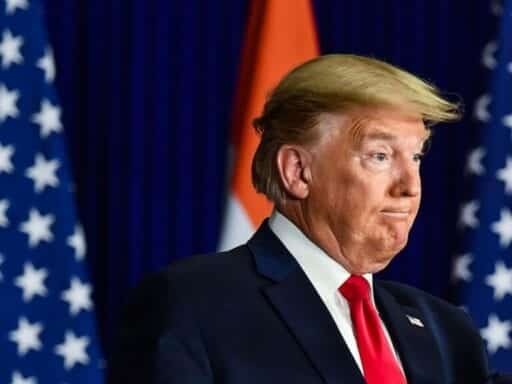Ahead of the Supreme Court hearing cases about his tax records, Trump openly attacks justices for insufficient loyalty.
Ahead of the Supreme Court hearing arguments on cases about whether Congress should have access to his tax and financial records, President Donald Trump is calling for two of the court’s liberal women justices to recuse themselves from any cases involving him.
During a news conference on Tuesday in India, Trump was asked by John Roberts of Fox News about a Fox News-inspired tweet he posted hours earlier calling for Justices Ruth Bader Ginsburg and Sonia Sotomayor to “recuse themselves on all Trump, or Trump related, matters!” The president responded by describing the basis for his demand as “very obvious.”
“I always thought, frankly, that Justice Ginsburg should do it, because she went wild during the campaign when I was running,” Trump said, referring to criticism Ginsburg made of Trump during the 2016 campaign that she later apologized for. “I don’t know who she was for — perhaps she was for Hillary Clinton, if you can believe it — but she said some things that were obviously very inappropriate.”
Turning to Sotomayor, Trump, without providing any specifics, claimed “she said what she said yesterday. You know very well what she said yesterday. It was a big story. And I just don’t know how they can not recuse themselves from anything have to do with Trump or Trump-related.”
Roberts pressed Trump to provide details about the Sotomayor comments he found objectionable, asking, “What was inappropriate about the statement? … she seemed to criticize the White House for running to the Supreme Court at the drop of the hat.”
“No, I don’t think that was it,” Trump said. “But I think what she did say is that she’s trying to shame — the way I look at it, she’s trying to shame people with perhaps a different view into voting her way. And that’s so inappropriate.”
Trump, during news conference in India, explains that he thinks Justice Ruth Bader Ginsburg should recuse herself from cases involving him because she didn’t support him in 2016. He also calls on Justice Sotomayor to recuse herself for an unspecified “inappropriate” statement. pic.twitter.com/fb0WqOXKvp
— Aaron Rupar (@atrupar) February 25, 2020
Trump’s attacks on Supreme Court justices he perceives as being insufficiently loyal to him point to how, following his impeachment acquittal, he’s feeling increasingly emboldened to attack any and all checks on his power. They also illustrate his conviction that anybody who has said a critical word about him, even indirectly, is disqualified from involvement in cases pertaining to his interests.
Sotomayor wasn’t trying to shame anyone. She was making an argument about the system of checks and balances.
Trump’s comments about Sotomayor seemed to refer to a dissent she wrote last week regarding the Court’s decision upholding a Trump administration rule restricting low-income immigrants’ ability to enter the US. In her dissent, she offered a warning about the Court doing special favors for Trump.
Sotomayor cited an unprecedented number of instances in which the Court’s Republican-appointed justices have granted emergency Trump administration requests to overturn lower court rulings blocking rules, even in cases where the notion that an emergency is taking place is dubious.
“It is hard to say what is more troubling: that the Government would seek this extraordinary relief seemingly as a matter of course, or that the Court would grant it,” Sotomayor wrote.
Sotomayor’s dissent did not directly accuse the Court’s Republican-appointed justices of “being biased in favor of Trump,” as the president characterized it on Twitter. But Trump apparently became angry about it after watching a segment about the dissent from India on Monday’s edition of Laura Ingraham’s Fox News show.
….on all Trump, or Trump related, matters! While “elections have consequences”, I only ask for fairness, especially when it comes to decisions made by the United States Supreme Court!
— Donald J. Trump (@realDonaldTrump) February 25, 2020
One irony of Trump’s attacks on two of the Court’s justices for alleged bias is that they came a day after Axios broke news that Ginni Thomas, wife of Supreme Court Justice Clarence Thomas, is leading efforts to assemble “detailed lists of disloyal government officials to oust — and trusted pro-Trump people to replace them.”
Another irony is that Trump was so upset with then-Attorney General Jeff Sessions’s decision to recuse himself from campaign-related investigations that he ended up firing him — despite the fact that Sessions, who served as one of Trump’s most prominent campaign surrogates in 2016, clearly had a conflict of interest and therefore did the right thing by recusing.
It’s not exactly breaking news that Trump is comfortable with hypocrisy, believes the function of the federal government should be to protect him, and only has concerns about conflicts of interest in cases where he can weaponize them against his perceived foes. What is news, however, is that the president is becoming more and more brazen about using flimsy pretexts to make authoritarian attacks on the highest court in the land — attacks that appear aimed at denigrating yet another check on his power.
The news moves fast. To stay updated, follow Aaron Rupar on Twitter, and read more of Vox’s policy and politics coverage.
Author: Aaron Rupar
Read More



